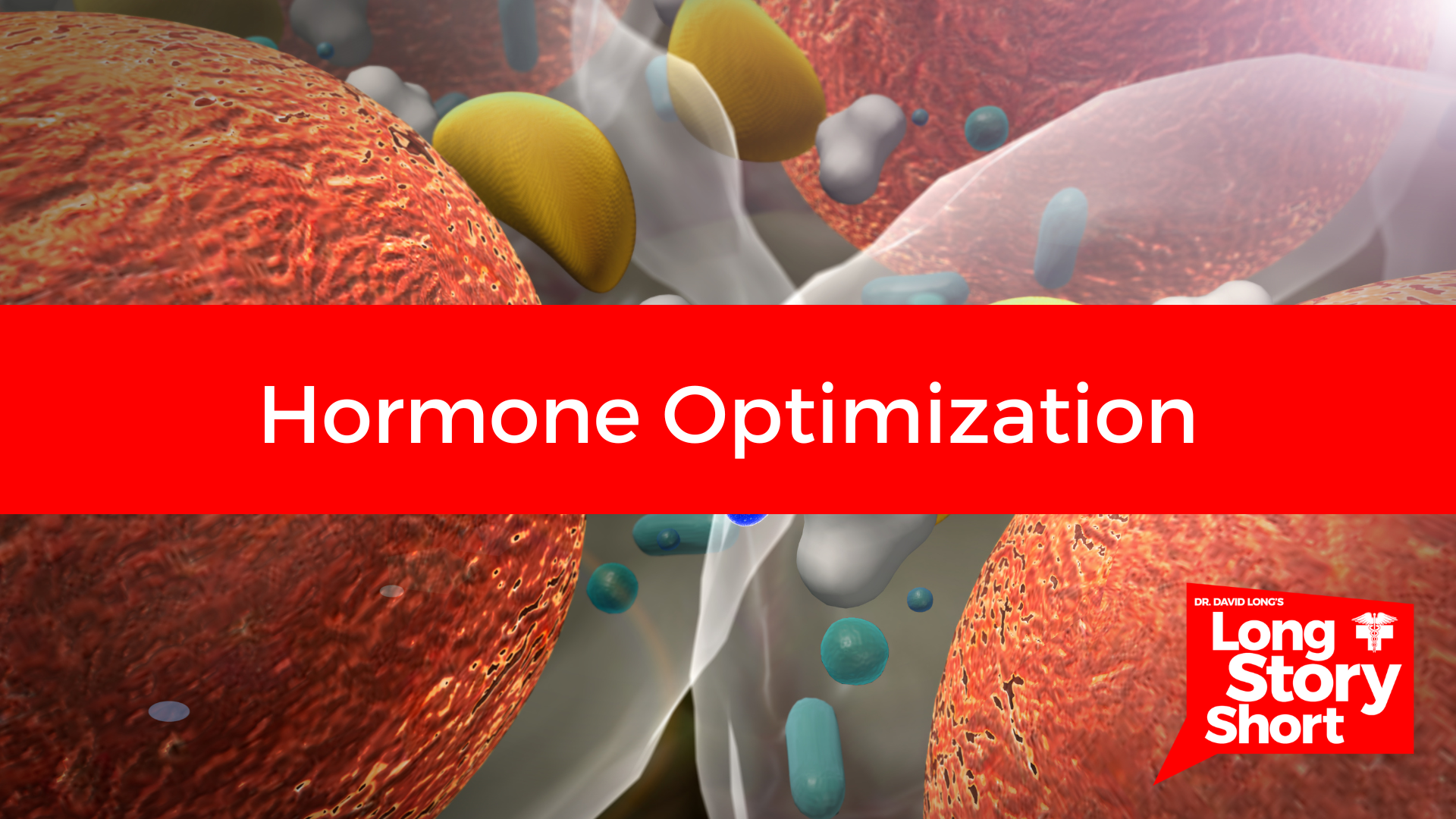Hormone Optimization
•Dr. David Long discusses the idea of hormone optimization, which is a process of treating the underlying hormonal imbalance that a patient has rather than just treating symptoms with medication.
• Hormone optimization has been around for a long time, but people have not been utilizing it because they accept fatigue, weight gain, and other symptoms as part of aging.
• The same process that happens in menopause happens to men as they age, but the symptoms are less obvious.
• Pellet therapy is one way to replace hormones that is less invasive than injections and more effective than gels or patches. It also uses bio-identical hormones which have fewer side effects than synthetic hormones.
Full Text
If you are like me, you may have noticed that as we get a little older, fatigue tends to set in. Our joints start to hurt more than they used to. Boy, that deep, restful sleep becomes harder to come by. Maybe libido is not where it used to be. For the longest time, we’ve just kind of had to accept that that’s part of aging. Well, I’m putting on a spare tire here. Well, that’s just aging. My joints hurt. Well, you know, you’re just getting older. And the truth is there’s something to be said for acceptance of things that we can’t change. But, ladies and gentlemen, that is something that we can change now. I’m Dr David Long. I’d like to spend a few minutes speaking with you about hormone optimization.
Hi, I’m Dr David Long. I wanted to spend a few minutes today talking about the idea of hormone optimization. You see, physicians are really excited every time we have a new dietary approach, or perhaps a new procedure – maybe even a new medication to better treat patients for specific conditions, and really helps us take better care of them. And one way that we can do that is with hormone optimization. Rather than treating fatigue with a medication or difficulty losing weight with a new medication or even a new dietary plan, we can get a lot more bang for our buck by treating the underlying hormonal imbalance that a patient has. And see, this has been around for a long time. Turns out that the pellet therapy, which is the preferred way to treat that, has been around since 1939.
So there’s nothing new. There’s nothing experimental about it, but people haven’t been utilizing that for a few years. We’ve been kind of conditioned to tell ourselves that oh, my achey joints, well, I’m just getting older or that new muffin top, the new spare tire that I have… well, it’s just part of getting older. And there’s a healthy component to that. We need to be an acceptance of things that we can’t change. But what if we could change that? As it turns out, a lot of times when we have that fatigue, maybe that mental cloudiness, maybe that difficulty losing weight, maybe that depressed mood, or that afternoon lull is more often because of a decline in our hormone levels, whether it’s thyroid, testosterone, perhaps estrogen for women. And when we can restore that to it’s natural balance, so many other symptoms can simply disappear.
Take, for instance, your thyroid. Maybe our thyroid is out of whack. Well, that patient may complain of fatigue. They may have depression. They may have weight gain. They may be cold all the time.They may have hair changes. Well, I have a pill for every one of those. I have a medication I can use to treat all of those. But how much better would it be if we could go beneath that? If we could treat the underlying cause, and fix the thyroid then so many of those symptoms get better on their own!
And what that leads us to is less medication and almost always less medication is ideal. So as we’re getting older, one of the first things that happens in that process is our hormone levels dropping off. We have recognized this. We have treated this aggressively in women for many years. When I was in medical school and residency, you couldn’t go three days without new information about recognizing and appropriately treating menopause. She’s got hot flashes, or she’s having some irregular cycles. These are things that we were taught to aggressively treat for good reason. That’s the way it should be. But I made it through all of my training without ever really understanding the same thing happens in men.
Maybe the symptoms aren’t as obvious. It might be more like fatigue. It might be more like some difficulty losing weight. Or perhaps it’s a list of symptoms that men don’t want to speak about on a regular basis. Anyhow, the same process happens with them. And now I’m so excited that rather than chasing these symptoms, we can treat the underlying condition and really improve the quality of life of that patient.
So there’s different ways to replace hormones and replacing hormones would mean we take somebody who is – if this is the normal range, maybe we do some blood work and their level comes in here. It is objectively low, and the doctor might say, “Well, we need to replace your hormones and replace them to get them into the normal range.” And while that has purpose, I’m more interested in hormone optimization. I’d like to take the person whose blood tests might indicate that technically, they’re in the normal range. But if I’m in the normal range here with symptoms, I’d rather be in the normal range here without symptoms.
So there’s different ways you can do that. Testosterone, for instance. You can use a patch, you can use a gel. Typically, those won’t get the levels where they need to be. You can use injections, and injections are useful. You have to do it every week, and so we get a shot and our levels are great, and then we need a shot, and then we take a shot, and then we need a shot….
The other method that I prefer is pellet therapy, wherein we take the hormone pellet that’s between the size of a grain of rice and a tic tac. And we numb up a little area on the skin and behind the hip back here. Put that under the skin, and that’s it. Then there’s a constant release of hormones for somewhere between three and five months, depending on whether it’s for females or for males. And what we see then is less of the roller coaster. And since the pellets are bio-identical hormones. They’re not synthetic. We see fewer side effects. This is the exact same kind of hormone that our bodies used to make, and now we can restore them to the levels we used to have. We age so much better. Feel so much better.
The way this works is it begins with a consult, where you meet with your doctor. You go over the list of symptoms that are bothering you, and your doctor matches those symptoms with what potentially could be hormonal related condition. Then we get a blood test to confirm if your hormone levels are low, whether it be thyroid or estrogen or testosterone. At that point, assuming that there’s no contra-indications, there’s no reasons not to do it for the safety of the patient. Then we have you come back 10 or 15 minute procedure to get the pellets placed. And then after that, we’ll see you back in 4 to 6 months. Four for females, six months for males and do it all over again if you found that the symptoms that you presented for have been adequately addressed.
One of the things that I really like about hormone optimization is that it is not one size fits all. We are interested in what this patient needs, which will be different from the next patient and different from the one after that. We take your blood work and your symptoms. We put it into some software, and it tells us exactly what level of hormones to target for that patient. So once we do the pellet procedure, we have you come back in six weeks for females, four weeks for males, to do just an abbreviated amount of blood work to be sure that the dose that we came up with is indeed the dose that you need. After that, we’ve got the code. And from then on we can keep restoring and replacing and optimizing your hormone levels for as long as you’d like.
See, for the longest time, physicians wisely said to women, “Hey, we want to get you on some estrogen replacement, but only for a brief period of time.” Well, why would they say that? They say that because of the side effects that we think could be related to estrogen. But we need to qualify that. When we speak of that kind of estrogen, we’re talking about synthetic estrogen. It’s where it might be related to breast cancer. There might be some association with heart disease. When we use bio-identical hormones rather than synthetic hormones, we simply don’t see those side effects. In fact, we actually see a decrease in the incidence of breast disease and heart disease.
So if we’d had this conversation about a year ago and you came to me looking to optimize your hormone levels with pellet therapy, I would have said, “You know, I think there’s something to that, I’m not real sure. I don’t know that there’s enough really solid, high quality evidence and not enough scientific studies to support it.” Well, as it turns out, I became more interested. And so I went to training. I went to learn about it, and what was fascinating to me when I went to training was that it was not just a show to put on to impress me how amazing it was. It was more like – here’s a study about heart disease with testosterone therapy. Here’s a study about synthetic estrogen and breast cancer versus bio-identical estrogen and breast cancer. Here’s another study comparing synthetic testosterone to all natural testosterone. I was really wowed by the amount of good, solid evidence there is supporting this treatment strategy. So then I came home, and before I even began to offer this procedure to my patients, I thought, You know, I think I’d like to become a patient first. And so I can tell you not only as a physician but as a customer, as a patient, that this has worked well for me, and I think you might be a candidate as well.
So if any of those symptoms, like fatigue or weight gain, insomnia, perhaps low libido. If any of those resonate with you, call the clinic today. Let’s get you a consult. Let’s see if you’d be a good candidate for hormone optimization and get you on the road to aging well.





 and then
and then